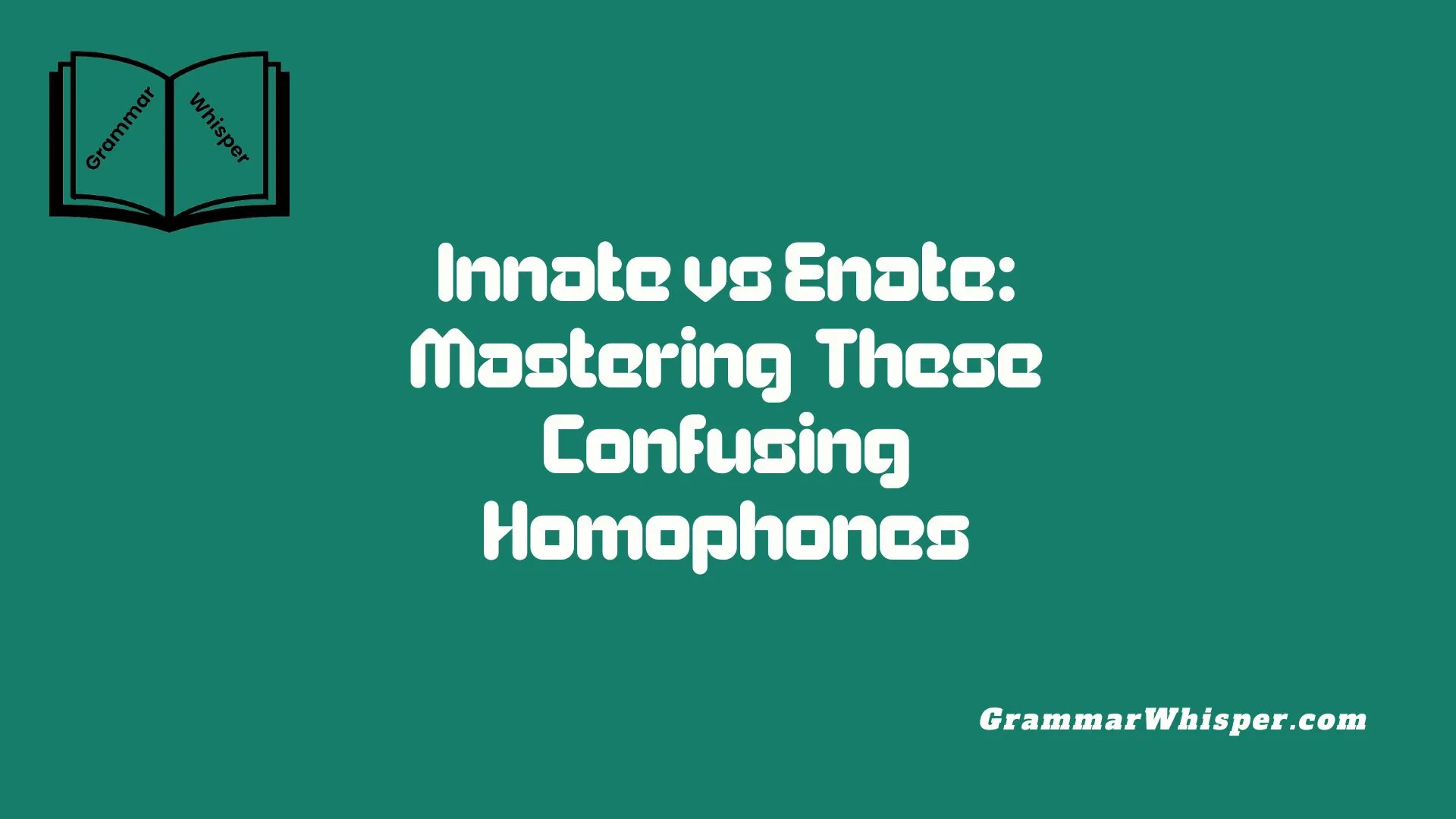As someone who’s worked with language for many years, I’ve seen even experienced writers get tripped up by challenging homophones – those words that sound the same but mean something totally different. The pair “Innate vs Enate” offers a prime example. Though nearly pronounced identically, their meanings are worlds apart. I once found myself editing an article where the author had used “enate” instead of “innate” to describe a natural talent – completely shifting the sentence. That moment made it clear: knowing how to tell such words apart lets you use them with greater confidence and maybe even a bit of flair.
The word “innate” refers to something you’re born with – such as an ability to write or draw. In contrast, “enate” is an archaic term denoting a maternal relative, like an aunt on your mother’s side. Few people still use “enate,” though it occasionally appears in legal or historical texts. Understanding the context helps you choose the right word, especially in formal writing. As a language editor, I’ve found that mastering these details not only sharpens your skill, but also gives your writing a more polished voice – a mark of true understanding.
Understanding Homophones: Why They Matter
Homophones are words that sound identical but have different meanings and spellings. They’re everywhere in English (for example, their/there/they’re or affect/effect). Misusing them can confuse your reader – or worse, make you seem careless or less professional.
Innate and enate deserve special attention because:
- They sound alike when spoken.
- They come from different origins and carry distinct meanings.
- Spellcheck won’t always catch mistakes, because both are real words.
Use this guide to master these two words – and sharpen your writing overall.
What Does Innate Mean?
According to Merriam‑Webster, innate is an adjective meaning:
“existing in, belonging to, or determined by factors present in an individual from birth: native, inborn.”
Word Origins & Usage
- Latin root: innatus, past participle of innasci (“to be born in”)
- Entered English in the 15th century as a descriptor for inborn traits.
- Common across fields – psychology, biology, philosophy, and everyday speech.
Why Innate Works in Writing
- Tells readers something is natural, not learned.
- Lends precision and credibility.
- Easy to spot and define in usage.
Example Sentences
| Context | Example Sentence |
| Everyday | “She has an innate gift for improvisation.” |
| Academic | “Language acquisition is partly due to innate neural structures.” |
| Scientific | “Some birds have innate migratory patterns.” |
Common Synonyms for Innate
- inherent
- inborn
- intrinsic
- instinctive
- hard‑wired
- Congenital. Each adds nuance – choose the one that fits best!
Exploring Enate: What It Means
Enate is a far rarer term. Merriam‑Webster lists two main meanings:
Word Origins & Usage
- Latin root: enatus, from enasci (“to be born out of”)
- Often appears in legal, anthropological, or historical texts about lineage.
- Also used in biology, but that’s quite uncommon.
What You’ll See in Text
It’s mostly about maternal kinship:
“An enate is any relative from your mother’s side.”
You might also find:
- enatic (adjective): “her enatic relatives”
- agnate (opposite): paternal-side kin
Example Sentences
- “She was proud of her enate grandmother, who had emigrated from Italy.”
- “In the study, enates showed consistent maternal transmission patterns.”
Synonyms & Related Terms
- enatic
- maternal
- matrilineal You’ll rarely use “enate,” but if you’re writing about heritage, kinship, or anthropology, it adds a sharp, precise touch.
Innate vs Enate: Quick Comparison Table
| Feature | Innate | Enate |
| Meaning | Inborn, natural | From the mother’s side, growing outward |
| Part of Speech | Adjective | Noun or adjective |
| Common Usage | Very common | Rare (most English speakers don’t know it) |
| Typical Context | Personality, skills, and biology | Genealogy, legal documents, and academic work |
Mnemonic Tip
- INNATE has IN – think “in your nature.”
- ENATE starts with ENA – like “ma” (mother backwards, loosely).
Why Getting It Right Matters
- Clarity: The Reader knows exactly what you’re describing.
- Credibility: Correct usage = professional writer.
- SEO Rank: Correct keywords and context improve search value.
Other Commonly Confused Homophones
- affect vs. effect
- complement vs. compliment
- principle vs. principal
- discreet vs. discrete
Mastering innate vs enate helps sharpen your overall homophone awareness.
Quick Self-Quiz
Test your usage – no fluff, just real learning:
Fill in the blank with innate or enate:
- Her ______ ability to empathize drew people to her.
- I researched my ______ cousins on my mother’s side.
- Children’s ______ curiosity drives early learning.
Conclusion:
In the world of English homophones, innate and enate are a rare but meaningful pair. While they sound the same, their meanings couldn’t be more different. One refers to inborn qualities, the other to maternal lineage, and confusing the two can drastically change your message.
Understanding these terms isn’t just about vocabulary. It’s about precision, clarity, and credibility. Writers who pay attention to subtle distinctions like these elevate their craft and stand out in a crowded digital space.
To recap:
- Use innate when talking about natural abilities, traits, or instincts.
- Use enate when referring to a relative on the mother’s side, particularly in historical, genealogical, or anthropological writing.
Homophones may seem like small hurdles, but mastering them builds habits that help you write with more intention and authority. The more you refine these details, the more your writing communicates clearly and powerfully.
FAQs:
What is the key difference between innate and enate?
Innate means something natural or inborn, like talent or instinct. Enate, on the other hand, refers to someone related through the maternal side of a family or to something that grows outward (in rare scientific contexts).
Is enate still used in modern English?
Not commonly. It’s considered archaic or academic, mostly found in genealogy, legal writing, or anthropology. That said, it’s still valid and understood in those circles, especially in contrast with the term “agnate” (relatives on the father’s side).
Can I use ‘innate’ instead of ‘natural’?
Yes, but use it with purpose. While both can describe something present from birth, innate emphasizes that a trait is deeply embedded, instinctive, or intrinsic. It often sounds more formal or scientific than “natural.”
Are there other homophones like innate vs enate that writers mix up?
Absolutely. Some other commonly confused homophones include:
- Discreet vs. Discrete
- Principal vs. Principle
- Compliment vs. Complement. Each can subtly shift meaning if used incorrectly, so attention to detail pays off.
How can I avoid homophone errors in my writing?
Try these tips:
- Read your work aloud – you’ll often hear mistakes you won’t catch reading silently.
- Use writing tools like Grammarly or Hemingway to highlight incorrect word usage.
- Keep a running list of commonly confused homophones.
- Learn word origins – etymology gives you clues that stick.











